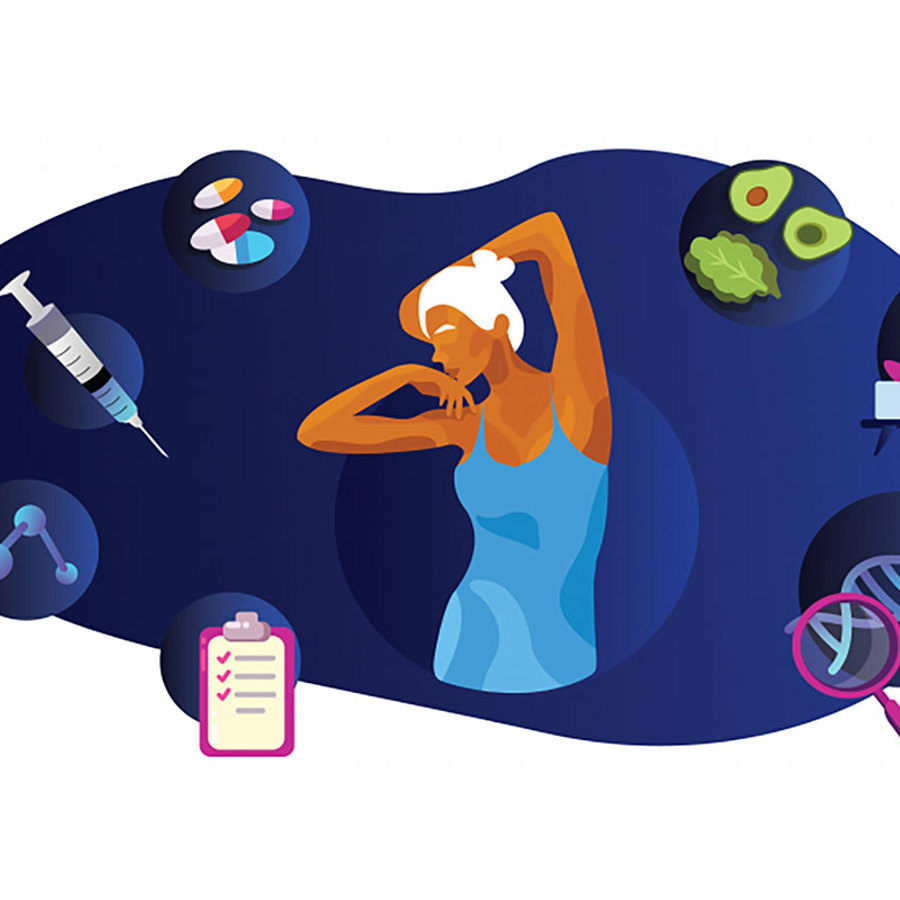
If DNA determines whether we get a disease, what is the point of lifestyle changes?
February 28, 2008

- Related Topics:
- Complex traits,
- Genetic conditions,
- Environmental influence
A curious adult from the United Kingdom asks:
“Does the process of, say, reducing our cholesterol intake change the inherited DNA through the mutation process? If not, then what is the point in reducing our cholesterol? We’re destined to die of a heart attack so we might as well eat what we like. The same applies to that worrying disease Alzheimer’s. We are told if we exercise our minds, study a foreign language (which I am reading about Genetics) it will help to prevent the disease. Yet, if it is encoded in our DNA how can this be changed?”
This is a great question! It really gets at whether a medical condition is caused by our lifestyle or our genes. The answer, like many questions dealing with genetics, is that it depends.
What it depends on is the disease. Some diseases like cystic fibrosis or sickle cell anemia are very much like you describe. If you get a certain version of a gene, you almost always get the disease.
But very few common diseases are like this, including high cholesterol and Alzheimer’s. What happens with these diseases is you inherit genes that make getting a disease more or less likely. Lifestyle can then change these odds either way.

Let’s use high cholesterol to show how this works. To be specific, let’s focus on high levels of the bad cholesterol, LDL*.
Cholesterol moves around the body in the bloodstream, which travels in tubes called arteries. In the bloodstream, LDL-cholesterol will sometimes break apart and get trapped in the walls of the arteries. This is where the problems begin.
When your arteries get filled with gunk, it’s like an old water pipe in a house that builds up hair and debris. Over time, less and less water can flow through the water pipe, and eventually it gets clogged.
As the LDL builds up, the arteries become narrower and narrower until finally, no blood can flow at all. Serious problems happen when blood can’t reach major organs. For instance, when blood cannot reach the muscles of your heart, you have a heart attack.
From all of this it should be obvious that having high LDL levels is bad. But where do the high levels come from? Two places.
Some people’s genes give them naturally higher levels of this type of cholesterol. Usually this is because they have a certain version of the LDLR gene. Having this version of the gene is known as familial hypercholesterolemia or just FH.
But some people who do not have FH have high cholesterol too. Theirs comes in large part from the food they eat.
Our final LDL levels are a combination of our genes and how we live our life. So our risk for heart attacks comes from a combination of these two things as well.
Someone who eats cheeseburgers, doughnuts, and sits around all day is at higher risk for a heart attack no matter what his or her genes are. And someone who is predisposed to high cholesterol can lower his or her risk for a heart attack by eating right, exercising, and taking medicines.
The reason lifestyle changes can usually affect your cholesterol level has to do with the LDLR gene (the one involved in FH). To understand this, we need to remember that like other genes, the LDLR gene is really just the instructions for a protein. In the case of the LDLR gene, it has the instructions for making the LDLR protein.
The LDLR protein takes LDL-cholesterol out of the bloodstream. Anything that helps LDLR do its job will lower levels of LDL in the blood. And anything that keeps LDLR from doing its job will increase LDL levels.
For example, eating foods with high levels of cholesterol and saturated fat causes less LDLR to be made. Less LDLR means less bad cholesterol will be removed and so there will be higher levels of LDL in the blood. On the other hand, eating food low in cholesterol and saturated fat will keep LDLR levels up and remove more LDL-cholesterol from your arteries.

Taking drugs like statins is another way to lower LDL levels. Statins cause your cells to make more LDLR.
These lifestyle changes require that someone has some working LDLR in their body because they all act through the LDLR protein. I bring this up because the FH version of the LDLR gene has the instructions for making a broken LDLR protein. If you need LDLR protein to see the effects of these lifestyle changes, why can people with FH control their cholesterol? Because they still have some working LDLR protein.
Remember, we have two copies of most of our genes – one from mom and one from dad. LDLR is no exception. Most people with FH have a good and a bad copy of the LDLR gene (the chances of having one bad copy are 1 in 500). So these people make working and broken LDLR proteins and lifestyle changes can act on the working LDLR proteins.
But if you have two bad copies, treatment is difficult. The bad genetics will likely beat whatever good lifestyle decisions you can make. Luckily this sort of FH is very rare with only around 1 in a 1,000,000 people having it.
The bottom line is if you have one bad copy of LDLR you aren't doomed for a heart attack. You can control your levels of LDL-cholesterol by choosing to eat well and take medicine.
So as you can see, there are rare cases for high LDL-cholesterol where your genes control your medical outcome. However, most cases of high cholesterol (indeed most human traits) are controlled by both your genetics and your lifestyle.
This is similar to Alzheimer’s. There are rare cases of bad genes that almost always lead to Alzheimer’s. But usually Alzheimer’s is caused by your genes and your lifestyle.
You should continue to eat well and exercise your mind!
* Cholesterol comes in two forms: low-density lipoprotein- (LDL-) and high-density lipoprotein- (HDL-) cholesterol. Only having high levels of LDL-cholesterol is bad. High levels of HDL-cholesterol are actually thought to be good.

Author: George Wang
When this answer was published in 2008, George was a Ph.D. candidate in the Department of Biology, studying nervous system development in Kang Shen’s laboratory. George wrote this answer while participating in the Stanford at The Tech program.
 Skip Navigation
Skip Navigation
